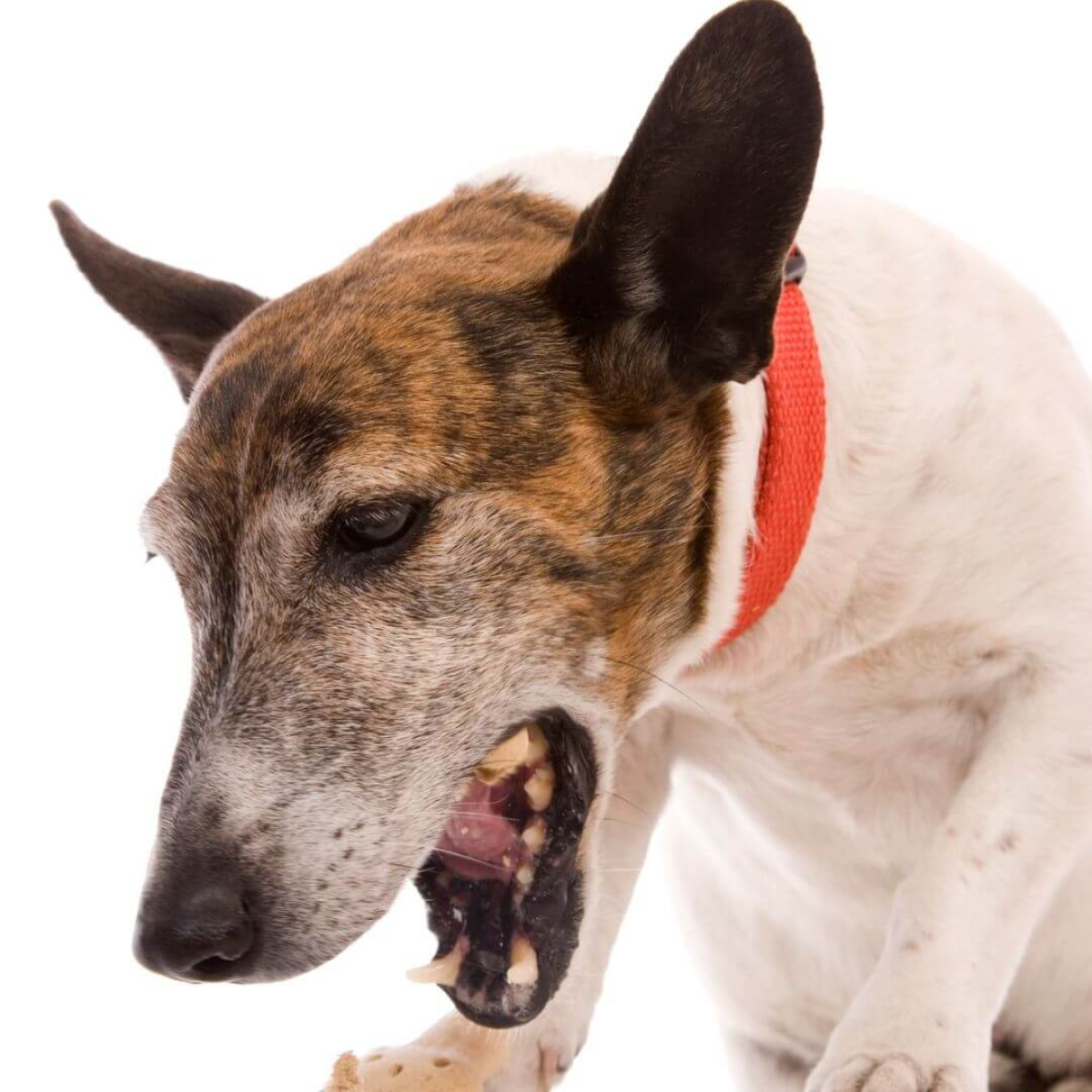When a dog coughs, it is primarily a reflex to clear the airways, removing mucus, foreign objects, or irritants like smoke. The causes of coughing can be diverse, ranging from ingested food causing a brief cough to bacterial infections, heart conditions, or tumors. Therefore, closely observing a coughing dog is crucial. If the cough persists or is accompanied by other symptoms, it is advisable to consult a veterinarian.
In this article, we explain the types of cough in dogs, potential causes, and when your furry friend needs veterinary attention. Additionally, we provide tips on what you can do to facilitate your coughing dog’s recovery.
What is Coughing, and What Does Dog Cough Sound Like?
Coughing (Latin: Tussis) in dogs is similar to that in humans. The body forcefully expels air voluntarily or triggered by the cough reflex, clearing the airways. The glottis opens, and the entire respiratory muscle contracts, expelling air rapidly from the airways.
Reflexive coughing in dogs is triggered by receptors on the mucous membranes of the throat, larynx, trachea, and bronchi. The stimuli can be chemical or physical.
The sound of coughing in dogs often resembles that in humans. While individual variations exist, different types of coughs also exhibit audible distinctions. Sometimes, distinguishing between coughing and retching can be challenging. In some dogs, coughing may sound similar to reverse sneezing.
If uncertain about the sounds your pet is making, recording a video and showing it to your veterinarian can provide clarity.
Two Types of Dog Cough
Generally, two types of cough are frequently observed in dogs: dry cough and wet cough. They not only sound different but also have—at least partially—different causes. Observing when the dog coughs, such as during excitement, exertion, or at night, provides valuable information for the veterinarian to make the right diagnosis.
The well-known kennel cough is an umbrella term for various upper respiratory tract diseases. It is named so because the pathogens can spread effectively through close contact among dogs, especially in situations like the common practice of housing multiple dogs in kennels. However, the kennel cough vaccine does not target a specific pathogen; it aims to reduce the likelihood of coughing by vaccinating against some prevalent viruses. It cannot prevent every infection.
When to Consult a Veterinarian?
Dogs, like humans, may cough occasionally, and it’s not always a cause for concern. However, if the cough persists, close observation of your pet is essential. Untreated coughing can have serious consequences for your dog.
You should call a veterinarian if:
- The cough lasts for more than 3 days.
- Your dog breathes more than 40 times per minute at rest (1 chest up and down = 1 breath).
- Additional symptoms such as fever or lethargy are present.
- Your dog has pre-existing conditions.
- Your dog coughs up blood.
Dog Cough: Dry Cough
If your dog is coughing and retching, it likely suffers from dry cough, also known as “irritation cough.” This cough sounds harsh and rough and is often painful for your dog.
Persistent irritation cough can, in some cases, lead to a vicious cycle: the act of inhaling air irritates and damages the mucous membranes, triggering a cough, which leads to inhaling air again. In this scenario, even a slight trigger, like pressure on the larynx or inhaling cold, dry air, can induce a new bout of coughing. If irritation cough develops into a chronic condition lasting an extended period, dog owners should promptly seek veterinary care.
Causes of Dry Cough in Dogs
Dry cough in dogs can have various causes. Some of them are harmless, triggering only a brief cough, while in other cases, an underlying disease may be the culprit. Here are the most common reasons for dry cough:
- Inhalation of Foreign Objects (e.g., food or liquids)
- Respiratory Tract Infection: Upper respiratory tract (e.g., throat/larynx inflammation) and lower respiratory tract (bronchitis/pneumonia/…)
- Parasites (e.g., lungworms)
- Inhalation of Irritants (e.g., allergens or smoke)
Sometimes, the situation itself can indicate that the cause of the cough is relatively harmless. Coughing during eating or drinking often suggests that your dog has swallowed something. If your dog coughs around a campfire, it’s likely due to inhaling smoke. In both cases, the cough usually disappears on its own within a few minutes.
However, if dry cough persists for an extended period or is accompanied by additional symptoms like fever, lethargy, or general discomfort, it is crucial to consult a veterinarian.
Chronic Irritation Cough in Dogs
Chronic irritation cough is diagnosed when symptoms persist for more than 2-3 weeks. The cause is always an ailment requiring veterinary treatment.
Possible reasons for chronic irritation cough include:
Tracheal collapse is often observed in smaller breeds such as Yorkshire Terriers, Chihuahuas, Pomeranians, Maltese, Miniature Schnauzers, and others. In older dogs, chronic coughing is often an indication of mitral valve insufficiency, commonly referred to as heart cough.

Moist Cough in Dogs
Moist cough is identified by the presence of secretions (mucus or fluid) being expelled. While mucus is frequently swallowed and not visible, moist cough is muffled and softer than dry cough. Additionally, a rattling or gurgling sound is often heard.
Moist cough can also be accompanied by retching, typically occurring at the end of a coughing episode, leading to the “vomiting” of secretions.
Causes of Moist Cough
Moist cough can result from various causes:
- Respiratory Infections and Inflammations (e.g., pneumonia; additional symptoms: weakness, lethargy, reduced appetite)
- Pulmonary Edema (fluid in the lungs due to heart disease)
- Heart Conditions (typical: coughing at night or early morning)
- Tumor (additional symptom: intensified breathing; usually heard only with a stethoscope)
Diagnosis: Why is Your Dog Coughing?
To determine why your dog is coughing, a veterinary examination is necessary. The veterinarian can make an initial assessment based on history. Therefore, observe the following points and communicate them to your veterinarian:
- How often and in what situations does your dog cough?
- Is the cough dry or moist?
- When does the cough occur? (Time of day, under stress or at rest)
- What is your dog’s general condition?
- Are there additional symptoms?
- Does your dog have pre-existing conditions?
- Are other animals in the same household affected?
Following the history, a clinical examination often provides initial insights. Swollen lymph nodes or tonsils, fever, or a red throat may suggest an infection. Auscultation of the lungs with a stethoscope can provide further information, such as the presence of fluid.
If a clinical examination is insufficient for a conclusive diagnosis, additional measures may be necessary. These can include X-rays, endoscopic examinations, or lung lavage, providing material for further laboratory tests. If needed, your dog may be referred to a specialized practice or animal clinic in consultation with you.
Your Dog Has a Cough: What to Do?
If your dog’s cough cannot be clearly attributed to a one-time situation, such as choking while chewing, it’s advisable to have them examined by a veterinarian. The treatment for the cough depends on its cause, making a precise diagnosis essential.
If your dog has a mild cold, there are several things you can do to alleviate their symptoms and facilitate recovery:
- Ensure plenty of rest for recovery; avoid exertion.
- Prevent chilling.
- Avoid dry air, as it can irritate the mucous membranes (place a water bowl on the heater).
- Strengthen your dog’s immune system.
- Walk your dog with a harness instead of a collar; a collar can irritate the throat, for example, through pressure on the larynx.
- If your dog has difficulty swallowing, moisten their food.
In such mild cases, home remedies like chamomile tea or homemade (unsalted) chicken soup may also help.
If your veterinarian diagnoses a severe infection in your four-legged friend, medications are often necessary. Mucus and cough suppressants help alleviate symptoms. For bacterial infections, your dog may be prescribed antibiotics. However, never administer these medications without consulting your veterinarian first!
If your dog struggles with chronic respiratory diseases, such as chronic bronchitis, additional anti-inflammatory and/or bronchodilator medications may be necessary. If your dog’s cough persists for several weeks or recurs frequently, it’s crucial to discuss it with your veterinarian. For older dogs, coughing can also be an indication of heart problems.
Unfortunately, coughing can also be triggered by severe illnesses, such as heart diseases that often result in pulmonary edema or tumors. In such cases, relieving the dog’s cough can restore their quality of life, but the underlying diseases must be treated for lasting improvement.
Prevention: Preventing Cough in Dogs
Regrettably, it’s not possible to shield your dog from every instance of coughing due to the diverse causes. Nevertheless, you can focus on strengthening your furry friend’s immune system. Ample exercise and a balanced diet also contribute to the health of our four-legged companions. Additionally, the vaccination against kennel cough provides protection against common cough-causing agents.
Beyond that, you can ensure your dog is not exposed to cough-inducing substances such as smoke or strong cleaning agents. When in doubt, it’s better to call the veterinarian. In most cases, coughs and their causes can be effectively managed, especially with prompt action.
Treating Cough in Dogs
Coughing in dogs is often not a cause for concern. However, if it persists for more than 2-3 days or is accompanied by additional symptoms like fever or lethargy, the dog should be presented to a veterinarian. By closely observing the animal and its cough, the type of cough can be easily determined, making it easier to identify the cause. Treatment depends on the specific cause and must be discussed with the veterinarian.


